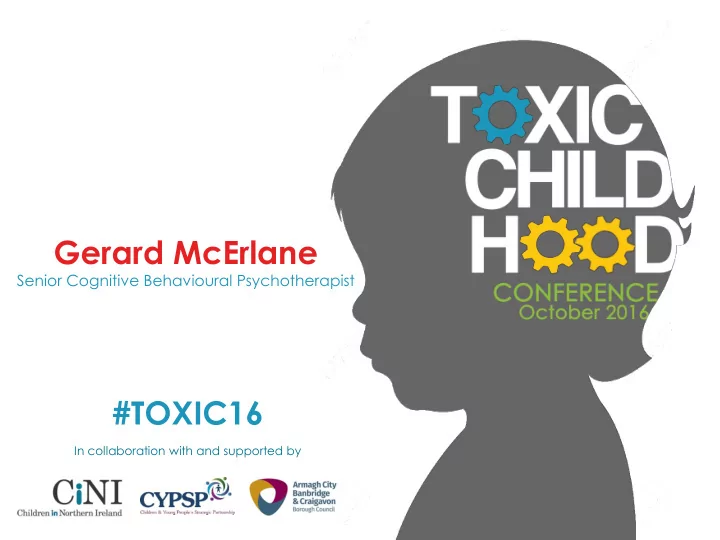

Gerard McErlane Senior Cognitive Behavioural Psychotherapist #TOXIC16 In collaboration with and supported by
CBT MODEL AS A CATALYST FOR CHANGE G E R A R D M C E R L A N E S E N I O R C O G N I T I V E B E H AV I O U R A L P S Y C H OT H E R A P I S T
OPERANT CONDITIONING • ….if a particular behaviour was consistently followed by a reward the behaviour was more likely to occur again. This phenomenon became known as the “Law of Effect” which states that behaviour which is followed by satisfying consequences will tend to be repeated and behaviour which is followed by unpleasant consequences will occur less frequently. ( Hawton et al 1996)
CBT MODEL QUID EST PROBLEMA Environment (Triggers) Thoughts Physical Feelings Moods Behaviours
CONCEPTUALISATION Why this person? Why now? What keeps the problem going?
FUNCTIONAL ANALYSIS Intended V Unintended consequences (What is the motivation for doing what we do?)
WHAT DO YOU KNOW ABOUT…….. StReSs
SIMPLE REFLECTIVE MODEL • What works? • What doesn’t work? • What keeps the problem going? (In the context of no blame and no judgement!)
PROCESS OF CHANGE
READINESS FOR CHANGE • Who’s responsibility? • What strategies to employ? • Challenges? • Where’s the balance?
LIGHT ON – LIGHT OFF?
A FACEBOOK REFLECTION It’s almost midnight on a Sunday night. A new week is about to start. I know I have to be up at “stupid o’clock.” Yet, I continue to scroll through Facebook, reading useless stuff about people I don’t even say hello to on the street! What a numpty! (Text edited in the interests of decency!)
SERIOUSLY…….. Mind your own business
THE FUTURE
THOUGHT FOR THE DAY Have you planned to stare at your phone anywhere nice this weekend?
IF AT FIRST WE DON’T SUCCEED …….. Difficile est tenere quae acceperis nisi exerceas nos – It is difficult to retain what we have learned unless we should practice
HOW WAS IT FOR YOU Thank you for your undivided attention. It’s good to talk…..and listen!
#TOXIC16 In collaboration with and supported by
Recommend
More recommend